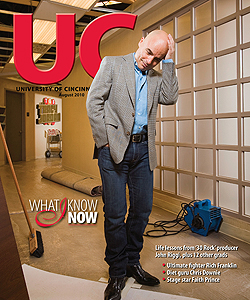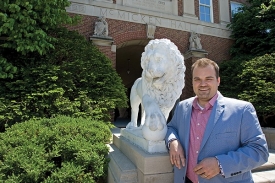Eric Winegardner, A&S '98
Just six years after graduating from the University of Cincinnati, Eric Winegardner became a vice president for Monster Worldwide, parent company of career giant Monster.com. The VP of client adoption came to Monster after working in recruiting for American Financial Group/Great American Insurance in Cincinnati. Now, he works to understand the shifting landscape of "work" in a new economic reality and is a living example of his main piece of advice for jobseekers: Be yourself, and find your passion.
I study the world of work. If we believe that our people are our No. 1 asset, then those of us with the most highly engaged people win. What does this changing landscape look like? How has the employee changed since my dad was working? I can lose myself in those questions. But if you would have asked me in college what I was going to be when I grew up, I would never have been able to articulate that.
For me, UC was the proof point that there was an entire world out there. I was just a small-town farm boy from northern Ohio. UC gave me a sense of appreciating how much I didn't know and a path to discover it. I had many hair-raising experiences in college just because I came from such a small rural environment.
I was bit by the bug when I worked off-campus with a staffing firm in town. It was a total fit for me and my skill set.
Any Fortune 500 environment is risky if you aren't willing to be wrong. I think Monster appreciated my perspective because I was younger and didn't have 20 years of doing it one way. I was an early adopter of the Internet and saw it as a glass half-full opportunity. I was very eager to try new things and move us away from traditional outlets and into this whole Internet space.
White-collar Americans work more than they do anything else. I work more than I sleep, more than I spend time with my family. Therefore, my work life is tightly aligned with my own identity. If I'm going to leave my kids everyday, it better be for a purpose.
We should have what the millennials are now demanding. We should have purpose. My identity does not come from working for a large organization. People work for people, not for companies. We should be talking about the culture of your team, not your company.
We are not entitled to our jobs. But a year from now, people will say to me, "Losing my job was the best thing that ever happened to me because I moved on and up, and I really had to take stock of the new reality."
What we don't talk about with 10 percent unemployment is that we have 90 percent employment. There's a huge population of people who just don't understand what all of this is about. They're going to work everyday, and they're seeing it very differently. They're seeing the effects in their 401(k)s being discontinued, in nonexistent salary increases, in loss of equity.
It's easy to get caught up in the negativity of the current situation because we're surrounded by it. The way businesses have had to innovate, the changes they're going through, it's unbelievable. But when we come out of this, we will do business differently, and that is progress.
When people do hire now, they are being much more selective and judging people based on their soft skills. If I'm interviewing three accounting directors, all three of them can probably do the job. They all have the technical skills. So I ask, "Who do I want to work with? Who do I want to run into in the elevator?"
For students, it's an exciting time to figure out what to be when they grow up. Engineering, especially with regard to alternative energy, and health care are obviously great industries to go into now. But I focus on the transferrable skills we all have. As I look across the job market at those who are successful in their respective fields, I see people who can tell stories and connect with other people.
That's what separates the A players from the B players: Not only adding tremendous value, but being able to articulate that value to others. You may be the most intelligent person out there, but if you can't communicate that to someone in a way that makes that person feel intelligent as well, you lose. We're in a people economy, and you have to understand people.
You have to be you and force your employer to reconcile with that. Don't change who you want to be, because it leads to long-term resentment. Life is too short and you work too hard for a job not to be a fit for you. Fit turns into passion.
Technology is a tool, not a strategy. A lot of people confuse the tool for the strategy instead of understanding how their strategy is enabled by technology. You have to be comfortable with technology and be a savvy user of it. Living out loud at work, being what you want to be instead of what someone else wants you to be, all those things become possible with technology.
It's a small world. Not burning bridges has a whole different meaning today in the global work world. Some people think of Monster as a small company with smart people who probably work in their moms' basements. But we're in 62 countries with 56,000 associates around the world.
No one says, "I want to clock in, clock out and not care." When employers realize this and try to figure out how to allow workers to find their passions, magic things happen. When you talk to people in India, China, the UK, the U.S., there are some universal truths around how they define work. They want passion, and they want to believe in what they do.
I'm just a boy living a dream. I have a lot of friends and colleagues who are brilliant, but don't have that feeling. They only see work as a means to an end. They don't get me because they can't identify with my passion.
I've loved every job I've ever had. I've felt that way since I was stocking shelves in high school. I think that is just something that's in you or not, and that is what helps you stand out. You can be self-made and on a corporate payroll.

 Issue Archive
Issue Archive